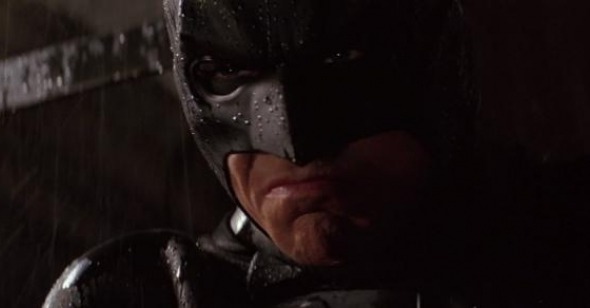For Starters
By Adam Nayman
Batman Begins
Dir. Christopher Nolan, U.S., Warner Bros.
Christopher Nolan’s Batman Begins is a fine example of the blockbuster as amuse bouche: the pleasure lies in knowing that the main course—in this case, the inevitable sequel, which we’ll probably get sometime in 2008—might just be superb. Batman Begins is merely pretty good—better, probably, than either of Sam Raimi’s uneven and curiously smug Spider-Man films, and at least as good as Bryan Singer’s X2: X-Men United, with which it shares both concrete virtues (seriousness of intent, pared-down design, a talented ensemble cast) and nagging flaws (structural wonkiness and an inflated running time). Ultimately, Nolan’s film is a triumph of casting: fan-types have been clamoring for Christian Bale since American Psycho. Because really, what is Patrick Bateman if not the slightly crazier, NC-17 version of Batman: a fantastically endowed sociopath-playboy in thrall to his deep-seated obsessions? Well, maybe that wasn’t Adam West’s Batman, but it certainly is Bale’s. He’s got the “pop jawline” Pauline Kael attributed to Christopher Reeve in Superman, but, luckily, none of Reeve’s incidental wholesomeness. Bale’s Batman/Bruce Wayne is a raspy, even nasty customer, visibly uncomfortable in his bourgeois secret identity guise (watch him squirm at a near-climactic cocktail party) and really only ever comfortable in jet-black Kevlar.
Batman Begins takes plenty of time getting him into the suit: the first 45 minutes, which have very little to do with Bob Kane’s original back story (and even less to do with Frank Miller’s Dark Knight graphic novel series) finds a testy, disillusioned, and long-since orphaned Bruce Wayne slumming it somewhere in the Himalayas, until he’s recruited by the super-secret terrorist cabal the League of Shadows. The guy doing the recruiting is Ducard (Liam Neeson), and it’s not going to spoil the movie for anyone to reveal that he’s also (to use some comic-book/videogame parlance) the “main” bad guy, a revelation that will be apparent to anyone who is not very young or very distracted. (The early scene in which he’s “killed off” might as well have a red flag superimposed over the bottom of the screen.)
Ducard’s late-act resurrection, and the way it dovetails with the rest of the narrative, is pretty poor, but it’s the mid-section that makes Batman Begins work. Once Bruce gets back to Gotham, he goes about becoming a superhero, in the process amassing some useful friends and associates, including company man Lucius Fox (Morgan Freeman), straight-arrow cop James Gordon (Gary Oldman), and, of course, faithful butler Alfred (Michael Caine). All three actors offer lovely, generous performances, each playing expertly off Bale’s terseness (Freeman’s scenes are master-classes in laconic comic timing) and accomplishing what the Spider-Man films, for all their kinetic grandeur, never quite managed—a stable of supporting players who we’ll want to see return time and again. Katie Holmes’s pallid love interest, do-gooder Gotham D.A. Rachel Dawes, won’t be back, and thank goodness: rather than being turned on by her buff, roof-scaling boyfriend, she tends to lecture him about duplicity and the need to really know oneself before knowing others. (Dawson Creek’s Joey Potter isn’t dead: she just works for the city.)
Rachel’s po-faced sanctimoniousness aside, Batman Begins manages the difficult feat of being serious (that is, not campy) without being pretentious (that is, like Spider-Man 2, with its interminable Rosemary Harris monologue about our—read: America’s— need for heroes.) There’s lots of discussion about fear, both as the impulse that drives Bruce’s nightly dress-up routine, and as the weapon wielded both by Ducard’s epigram-spouting warlord and his henchman Scarecrow (Cillian Murphy) a bent psychiatrist who has a funny mask of his own. The Scarecrow/Batman doubling is clever, and all the better because the film doesn’t spell it out for the audience. When the Scarecrow unleashes clouds of fear gas on Gotham—not the best-adjusted city to begin with—it’s actually kind of unsettling, especially when the chemically unbalanced victims start perceiving Batman as a flying fire-demon: It’s the first time in the screen history of the franchise that he’s been, well, scary.
Which brings us back to the amuse bouche metaphor: The final moments of Batman Begins are delicious—the villains have been summarily vanquished, Rachel’s lectures feel finished, and half of Gotham is still overrun by fear gas. Batman and (newly minted) Lieutenant Gordon share a brief rooftop idyll, during which the prospect of “escalation” is discussed—the criminals are going to get meaner, and there’s one “theatrical” fellow in particular who seems particularly worrisome. The coda promises enough that we’re willing to forgive Batman Begins its failings (the muddled action scenes being the most egregious missteps.) Nolan’s film has served its purpose—the exposition is out of the way once and for all, and, even better, it has set up a credible and compelling hero, a menagerie of vivid secondary characters, and a Gotham that actually feels like a real city with variegated architecture and a plausible criminal infrastructure, rather than an ornate, spire-and-gargoyle-strewn soundstage. Given that most comparatively budgeted films leave us bludgeoned and begging for mercy, it’s a high compliment indeed to say that Batman Begins leaves us ready for more.
